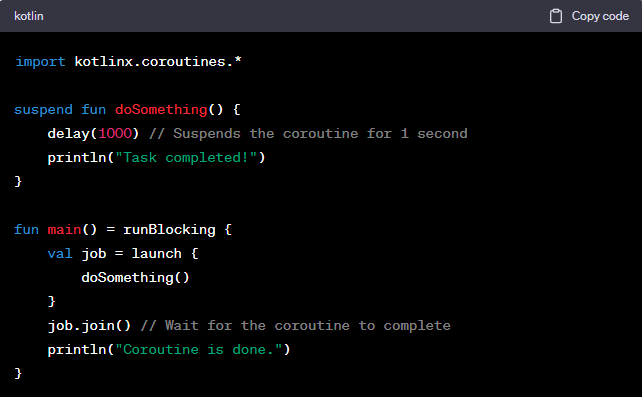Google Kotlin, a versatile programming language, is characterized by its cross-platform capabilities, static typing, and general-purpose nature, all enhanced by its efficient type inference. It boasts seamless interoperability with Java, leaning on the Java Class Library for its JVM-based standard library, while its inherent type inference feature enables more concise syntax. While Kotlin primarily aligns with the JVM, it exhibits the flexibility to compile into JavaScript or native code via LLVM. JetBrains and Google jointly sponsor Kotlin through the Kotlin Foundation, with Google officially endorsing and favoring it for Android mobile development.
Enhance your prowess in the Kotlin Programming language through dedicated learning. Elevate your mastery with the ultimate programming education app for Kotlin. Whether you’re delving into the fundamentals or aiming to achieve expert status in Kotlin Programming, this exceptional code learning application is your ideal companion. Explore the world of Kotlin programming at no cost using the comprehensive “Learn Kotlin Programming” app, your all-in-one destination for programming language proficiency. Whether you’re gearing up for a Kotlin programming interview or preparing for upcoming coding assessments, this app is an indispensable tool.
The Learn Kotlin Programming app is your gateway to a treasure trove of resources, including Kotlin Programming tutorials, insightful lessons, practical programs, interactive Q&A sessions, and all the essentials to establish a solid foundation or excel as a Kotlin programming virtuoso.
Encompassing an extensive repository of hundreds of annotated code examples, diverse questions and answers, this singular code learning app caters to all your programming educational requisites. By using Kotlin you can make full action packed games like God of War 2 PPSSPP.
Characteristics of Google Kotlin Programming
Google Kotlin is a modern, statically typed programming language that was developed by JetBrains, a software development company known for its popular integrated development environment (IDE) called IntelliJ IDEA. JetBrains introduced Kotlin in 2011, and it was officially released to the public in 2016. Kotlin is designed to be concise, expressive, and fully interoperable with Java, making it an excellent choice for Android app development, as well as a general-purpose language for various other application domains.
Here are some characteristics of Kotlin programming:
1. Concise Syntax: Kotlin boasts a concise and expressive syntax that reduces boilerplate code when compared to Java. This makes it easier to read and write, resulting in more efficient and maintainable code.
2. Statically Typed: Kotlin is statically typed, meaning variable types are known at compile time, which helps catch type-related errors early in the development process, improving code reliability.
3. Null Safety: Kotlin has built-in null safety features, which address the notorious null reference errors common in many programming languages. In Kotlin, you must explicitly define whether a variable can be null or not, reducing the risk of null pointer exceptions.
4. Interoperability: Kotlin is designed to work seamlessly with Java. You can use Kotlin in existing Java projects, and Java libraries can be used in Kotlin without any issues. This makes it a smooth transition for Java developers.
5. Functional Programming: Kotlin supports functional programming concepts, including higher-order functions, lambdas, and immutability. This allows for more concise and expressive code, particularly when dealing with collections and data transformations.
6. Extension Functions: Kotlin introduces extension functions, which allow you to add new functions to existing classes without modifying their source code. This is particularly useful when working with external libraries or APIs.
7. Coroutines: Kotlin includes native support for coroutines, which simplifies asynchronous programming. Coroutines make it easier to write non-blocking, concurrent code without the complexities of traditional threading.
8. Smart Casts: Kotlin’s type system includes smart casts that automatically cast a variable after a type check. This reduces the need for explicit casting in your code.
9. Data Classes: Kotlin provides data classes, which are concise classes for holding data. These classes automatically generate useful methods like `equals()`, `hashCode()`, and `toString()`.
10. Comprehensive Standard Library: Kotlin comes with a rich standard library that includes utilities for common programming tasks, making it even more productive for developers.
11. Multi-Platform Development: Kotlin supports multi-platform development, allowing you to share code between different platforms, such as JVM, JavaScript, and native (via LLVM). This can significantly reduce development effort when targeting multiple platforms.
12. Community and Industry Adoption: Kotlin has gained significant popularity, especially in the Android development community. Google officially endorsed Kotlin for Android app development in 2017, leading to widespread adoption in the Android ecosystem.
Features of Google Kotlin
Here’s an in-depth overview of the features you might find in a Kotlin programming environment or IDE:
1. Compile and Run Your Program:
A Kotlin development environment typically includes a built-in compiler or compiler integration that allows you to write and execute Kotlin code seamlessly.
You can initiate the compilation process with a simple click or command, and the environment will automatically compile your code into executable instructions for the target platform (e.g., JVM, JavaScript).
Running your program is often as straightforward as clicking a “Run” button, and you can see the output in the integrated console.
2. View Program Output or Detailed Errors:
After running your Kotlin program, the IDE provides a dedicated console or output window where you can view the program’s output. This is especially helpful for debugging and understanding how your code behaves.
If there are errors in your code, the IDE will display detailed error messages. It might even offer suggestions or solutions to help you fix the issues. This feature is invaluable for identifying and resolving bugs in your code efficiently.
3. Advanced Source Code Editor:
The source code editor in a Kotlin IDE is feature-rich, offering a range of tools to enhance your coding experience:
Syntax Highlighting: The editor highlights different elements of your code with distinct colors, making it easier to identify keywords, variables, and other code components.
Bracket Completion: The IDE often automatically adds closing brackets, parentheses, or braces as you type, reducing syntax errors related to unclosed brackets.
Line Numbers: Line numbers are typically displayed in the editor, aiding in navigation and debugging by providing a quick reference to specific lines of code.
4. Open, Save, Import, and Share Kotlin Files:
You can use the IDE to open existing Kotlin files, create new ones, and save your work conveniently.
Importing files from external sources or projects is typically straightforward, allowing you to easily integrate code from various locations.
Sharing code files is simplified through built-in export and sharing options. You can save your code locally or export it to a cloud service, a version control system, or even share it directly with others via email or other communication channels.
5. Customize the Editor:
Kotlin IDEs often provide extensive customization options, allowing you to tailor the editor to your preferences and needs.
You can typically customize:
Themes: Choose from various color schemes or create your own to suit your visual preferences.
Keyboard Shortcuts: Define custom keyboard shortcuts for specific actions or commands.
Code Templates and Snippets: Create and manage code templates or snippets to automate repetitive tasks.
Editor Behavior: Adjust settings related to code formatting, auto-completion, and code analysis to match your coding style.
Limitations of Google Kotlin Apk
Here are some limitations of Google Kotlin:
1. Internet Connection Required for Compilation:
An active internet connection is necessary to perform code compilation. The compiler may rely on online resources or services to compile your code successfully.
2. Maximum Program Running Time is 20 Seconds:
There’s a time restriction on program execution. Programs are limited to a maximum running time of 20 seconds. Long-running processes may be interrupted.
3. Limited File System, Network, and Graphics Functions:
Certain file system operations, network-related functions, and graphics operations may have restrictions or limitations. These limitations could affect the scope of what your program can do in these areas.
4. Batch Compiler; No Support for Interactive Programs:
The compiler operates in a batch mode, meaning it does not support interactive programs. For instance, if your program requires user input through prompts, you should enter the necessary input in the designated Input tab before initiating the compilation process. Interactive console-style input/output during program execution is not supported.
Kotlin Code Examples
Certainly! Here are some simple Kotlin code examples to demonstrate various language features:
1. Hello World:
2. Variable Declaration:

3. Nullable Types:

4. Function Declaration:

5. Conditional Statements:

6. Collections and Iteration:

7. Data Classes:

8. Extension Functions:

9. Lambda Expressions:

10. Coroutines (Asynchronous Code):

These are just some basic examples of Kotlin code. Kotlin’s flexibility and conciseness make it suitable for a wide range of applications, from simple scripts to complex software systems.
Guide about Android App Development
Android app development is the process of creating software applications that run on the Android operating system, which is primarily used in smartphones and tablets. Android app development offers a vast and diverse ecosystem, with millions of users and a wide range of devices, making it a popular platform for both developers and businesses. Here’s a more detailed overview of Android app development:
1. Android Operating System:
Android is an open-source operating system developed by Google and based on the Linux kernel. It’s designed primarily for touchscreen devices but is also used in various other form factors like smart TVs, wearables, and automotive systems.
2. Programming Languages:
Java and Kotlin are the two main programming languages used for Android app development. While Java has been the traditional language, Kotlin gained official support from Google in 2017 and has since become increasingly popular due to its concise syntax, improved safety features, and modern language constructs.
3. Development Environments:
Android Studio is the official integrated development environment (IDE) for Android app development. It’s based on IntelliJ IDEA and provides a powerful set of tools for designing, coding, testing, and debugging Android apps.
4. User Interface (UI) Design:
Android uses XML files for defining the layout and user interface of apps. Developers can design UIs using XML or by using Android Studio’s drag-and-drop UI designer.
5. App Components:
- Android apps are composed of several components, including:
- Activities: Represent user interface screens.
- Services: Run in the background to perform tasks.
- Broadcast Receivers: React to system-wide events or custom broadcast messages.
- Content Providers: Manage and share app data with other apps.
6. APIs and Libraries:
Android provides a vast set of APIs and libraries to access device hardware features like the camera, sensors, GPS, and more. It also offers libraries for networking, database management (SQLite), and user interface components.
7. App Distribution:
Apps can be distributed through the Google Play Store, which is the official app marketplace for Android. Developers can also distribute apps through alternative app stores or directly through their websites.
8. Testing and Debugging:
Android Studio offers a range of debugging tools, including emulators and virtual devices for testing apps on various screen sizes and Android versions. Developers can also test on physical Android devices.
9. Monetization:
Developers can monetize their Android apps through various means, including selling the app, offering in-app purchases, displaying ads, or providing subscription services.
10. Security and Permissions:
Android emphasizes security and privacy. Developers must request appropriate permissions from users to access sensitive data or device features.
11. Updates and Maintenance:
Regular updates and maintenance are essential for keeping Android apps compatible with new Android versions and devices. Developers need to ensure that their apps remain functional and secure.
12. Community and Resources:
Android has a vibrant developer community with ample resources, including documentation, forums, and tutorials, to help developers learn, troubleshoot, and improve their skills.
Android app development offers a wealth of opportunities for developers, businesses, and entrepreneurs to create innovative and user-friendly mobile applications. It continues to evolve with new features and technologies, making it an exciting field for software development.
How to Download and Install Google Kotlin Apk
If you are interested in downloading and installing Kotlin for Android development, I recommend using official sources and following the proper installation procedures. Here’s how you can do it:
-
Using Android Studio (Recommended):
- Android Studio is the official Integrated Development Environment (IDE) for Android app development. It includes Kotlin support out of the box.
- Download Android Studio from the official website: https://developer.android.com/studio
- Follow the installation instructions provided on the website.
- Once Android Studio is installed, you can create new Kotlin-based projects and start developing Android apps using Kotlin.
-
Installing Kotlin Plugin for IntelliJ IDEA:
- If you’re using IntelliJ IDEA for development, you can install the Kotlin plugin to enable Kotlin support.
- Open IntelliJ IDEA and go to “Preferences” (on macOS) or “Settings” (on Windows/Linux).
- Navigate to “Plugins” and search for “Kotlin.”
- Install the Kotlin plugin and restart IntelliJ IDEA.
- You can now create and work on Kotlin projects within IntelliJ IDEA.
Remember that using official sources ensures that you’re getting legitimate and secure versions of the software. If you’re specifically looking for an Android app that provides a learning resource for Kotlin, consider searching for official Kotlin learning apps on the Google Play Store or other reputable app stores.
Conclusion
Google’s adoption and promotion of Kotlin have played a pivotal role in its rapid rise in popularity, especially in the Android development community. Kotlin has become the preferred choice for many Android developers due to its modern features, improved safety, and seamless integration with existing Java code. The collaboration between JetBrains, Google, and the Kotlin community has contributed to the continued growth and success of the language in various application domains.
Frequently Asked Questions (FAQs)
Here are some frequently asked questions (FAQs) about Google Kotlin:
1. What is Kotlin?
Kotlin is a statically typed programming language developed by JetBrains. It's known for its conciseness, safety features, and seamless interoperability with Java. It's commonly used for Android app development and other application domains.
2. Is Kotlin an official language for Android app development?
Yes, Kotlin is an official language for Android app development. Google announced its official support for Kotlin in 2017, recognizing it as a first-class language for building Android apps alongside Java.
3. Why should I choose Kotlin for Android development?
Kotlin offers several advantages for Android development, including concise syntax, enhanced null safety, improved productivity, and seamless integration with existing Java code.
4. Do I need to learn Java to use Kotlin for Android development?
While Kotlin can be used independently, it's helpful to have a basic understanding of Java since many Android libraries and resources are still written in Java. Kotlin is designed to be interoperable with Java, making it easy to use both languages in the same project.
5. Where can I download the Kotlin plugin for Android Studio?
You can download and install the Kotlin plugin for Android Studio directly from the Android Studio IDE. Go to "Preferences" (on macOS) or "Settings" (on Windows/Linux), then navigate to "Plugins" and search for "Kotlin." Install the plugin from there.
6. Is Kotlin only used for Android development?
No, Kotlin is a versatile language that can be used for various application domains, including server-side development, web development, and native applications. It's not limited to Android.
7. Is Kotlin open source?
Yes, Kotlin is an open-source programming language. It is licensed under the Apache License 2.0, which allows for free use and modification of the language.
8. Are there learning resources available for Kotlin?
Yes, there are many learning resources available for Kotlin, including official documentation, tutorials, courses, and community forums. JetBrains and Google have provided extensive documentation and resources for Kotlin learners.
9. Can I convert existing Java code to Kotlin?
Yes, you can automatically convert Java code to Kotlin using Android Studio's conversion tools. This can help you migrate existing Java projects to Kotlin gradually.
10. Is Kotlin backward compatible with Java?
Yes, Kotlin is designed to be fully interoperable with Java. You can call Java code from Kotlin and vice versa without any issues. This makes it easy to adopt Kotlin in existing Java projects.






